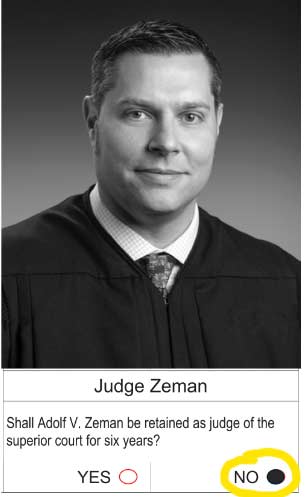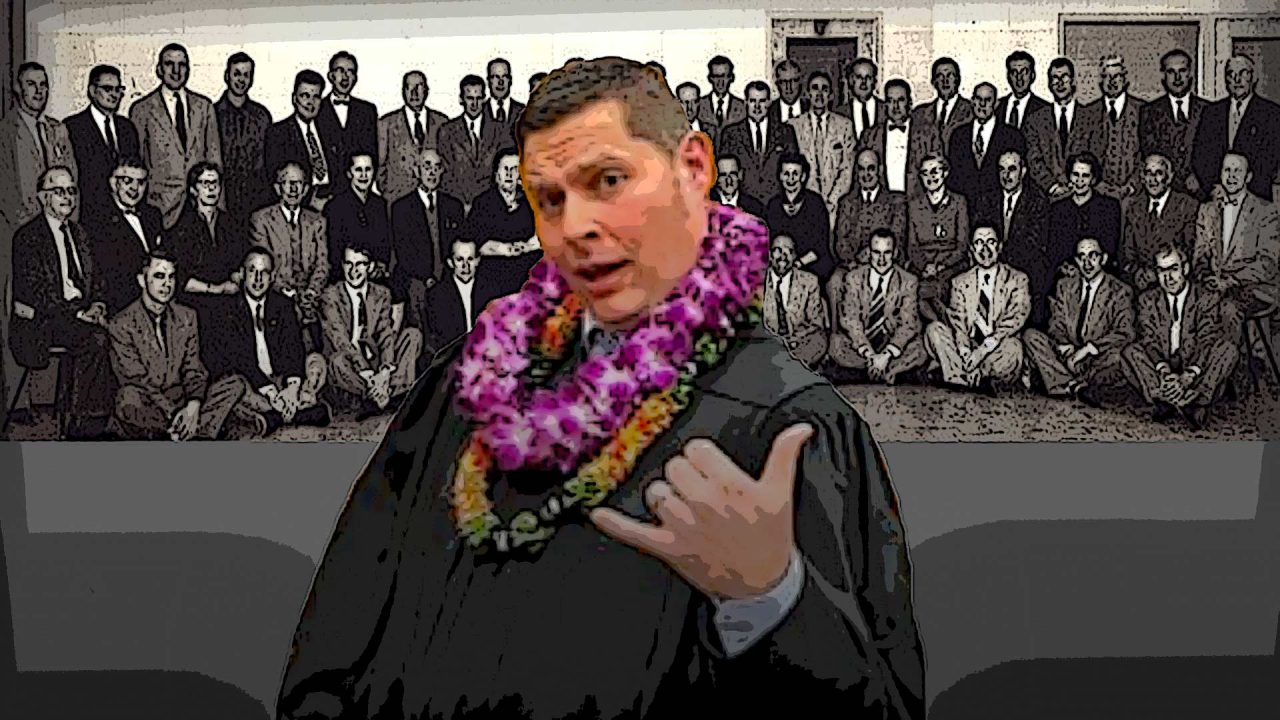
It’s as predictable as maroon and golden leaves fluttering to the ground in late autumn. People asking for information on how to vote for judges who are up for retention. It’s a bit of a sore subject for me.
Did you know that 19 judges are up for a retention vote by the people of Alaska this year? Predictably, most people don’t know anything about them – even the politically savvy are scrambling to get intel.

Association. It has the responsibility to rate judges based on performance standards such as legal knowledge, interpersonal skills, writing ability and other basic talents related to being a judge. They tell Alaskans whether a judge shows up to work on time, how long it takes to resolve cases, whether their peers and colleagues like them, whether they are courteous, and whether they ever volunteer at the puppy shelter. Ok … maybe not that last one, but the Alaska Judicial Council’s (AJC) assessment is very limited in scope.
The AJC is like a background checker. While there may be no apparent “red flags,” the person hiring (we the voters in this case) should do our homework.
The AJC assessment has nothing to say in terms of how judges ultimately rule or their legal opinions that affect citizens.
But judges are not immune from holding very different views on how to rule. Do they have an evolving view of our Constitution that changes over time, or do they have a more conservative view that attempts to determine the exact original intent of those who wrote a particular statute or our constitutional provision?
Although former U.S. Supreme Court Justices Ruth Bader Ginsburg and Antonin Scalia had an admirable and sincere relationship and were good friends, they differed markedly in how they viewed the Constitution, and thus how they typically ruled on specific cases.
Were they both qualified? Certainly, but that doesn’t negate the reality they had drastically different views on jurisprudence. To put it in political terms, Ginsburg was a liberal and Scalia was a conservative. Democrats acknowledge this when they do everything in their power to keep conservative judges off the bench, as do Republicans when a Democratic president nominates a radically activist justice.
I’d argue that the Left gets far more vitriolic when fighting a conservative candidate. Think of every U.S. Supreme Court candidate President Trump nominated and how much venom was employed. Why? Because the Left opposes the way in which they ruled on certain cases, and how they might rule in the future.
Despite the political theatre and manufactured allegations, the intense opposition to these appointees had very little to do with anything other than how they formed certain legal opinions.
The Alaska Judicial Council would have you believe that because they’ve rated judges based strictly on performance experiences, Alaskans should care less about the actual decisions that were made and how those rulings impact our lives. In the AJC’s view, the rulings are not something us “commoners” should dwell on. Nothing to see here. Move along. We’ve taken care of the vetting … just do as you’re told.
That is misguided and fraudulent.
Sometimes, however, judges issue decisions that give us a very clear picture of their mindset when it comes to the law.
The people of Alaska, as we do with the other two branches of government – executive and legislative arms – decide who to vote for based on how the governor and legislators cast their votes. Do we care about whether they’re qualified? Depends on your definition of “qualified.” I know my share of public office holders who might have rated as “highly qualified,” but who were absolutely out of their element in Juneau. I know others who might have seemed incompetent on many levels to run for office but who turned out to be brilliant tacticians as lawmakers.
We should do the same for judges. The Alaska Constitution gives us that right but it’s more difficult because most of the time judges make decisions that are not at all controversial or political. That makes it hard to know where they stand when it comes to their guiding legal philosophy.
Sometimes, however, judges issue decisions that give us a very clear picture of their mindset when it comes to the law. This is the case with Anchorage Superior Court Judge Adolf Zeman, who is seeking retention on Tuesday, November 5.
Earlier this year, Zeman created a firestorm by ruling that the distribution of public funds used by local school districts to reimburse parents for correspondence course payments was unconstitutional based on his faulty interpretation of what our state founders thought and wrote on this matter.
From an article out of Must Read Alaska, Suzanne Downing wrote, “Last week, a judge in Anchorage decided that the State of Alaska cannot pay for classes taken by students in Alaska, unless those classes are provided by public institutions – government schools. No more can the State pay for correspondence courses or private schools. Judge Adolf Zeman ruled that paying for private education is an unconstitutional use of state funds, thus effectively stripping that funding from some 24,000 students in Alaska who use correspondence programs. The National Education Association won a sweeping ruling for government control of education, dashing the freedom of choice that Alaska families now have.”
In another exceptional article in the Alaska Watchman, David Ignell detailed how Jack Coghill, one of the original members of the Alaska State Constitutional Convention, attempted to add language preventing any public funds from “indirectly benefitting” private schools but the delegates soundly rejected that idea based on their beliefs that families and students in Alaska had to have access to educational options other than government-run schools. The third sentence of Article VII, Section 1 of the Alaska Constitution prohibiting state funds going to the “direct benefit” of any religious or other private educational institution had to do with “the direct appropriation for building or maintenance of private institutions,” and nothing to do with providing alternative educational opportunities to students.
ALASKA WATCHMAN DIRECT TO YOUR INBOX
Anchorage Superior Court Judge Adolf Zeman, in his horrible ruling that attempted to strip tens of thousands of Alaskans from the right to an education based on what best suits the needs of their children, showed his true colors as one who thinks our Constitution can be molded and twisted to accommodate the whims of a political agenda.
Alaskans now have the opportunity, despite what the Alaska Judicial Council may say about his bedside manners, to vote no on Judge Zeman’s retention campaign. We should exercise that right and demonstrate that decisions have consequences.
If you are an Alaskan who believes in school choice, has experienced the freedom of educational alternatives for your family, or perhaps you are simply tired of activist judges imposing their personal views in the courtroom – now is the time to show Judge Adolf Zeman the door. Maybe, just maybe, that might slow down the trend of black robed lawyers interfering with our lives.
In any event, don’t let anyone ever claim that you should not concern yourself with how judges rule. It’s the reason we’re voting on them next month.
The views expressed here are those of the author.








15 Comments
Thank you for this article. We live in Fairbanks, so we do not have Adolf Zeman to vote on. We are aware of what he attempted to help the NEA since we are homeschoolers. We are still interested in School Choice or credits so we can access the funds without union interference. We are praying that our country will return to the Founding Principles used to write our Original Constitution and Rule of Law and the rest of the good things established with God’s help..
Thanks, Jim. Every Alaskan should know what Zeman has done and refuse his retention. I will share this article with as many as I can and see if we can’t oust him.
Zeman, my misprint. Sorry.
“When in doubt, vote them out.”
In Zeman’s case, there is no doubt: vote him out.
Too many words. Coulda just said he’s not a Christian, the end.
From a post I made:
It was clear to me in reading Zeman’s final judgment decision that he did not meet #1 of the 5 performance standards. This particular case was hugely consequential because it impacted 20% of Alaska’s K-12 students. I’ll copy the standards below and then discuss why I believe he failed to meet the first criteria.
1. Legal Ability. The judge demonstrates knowledge of substantive law, evidence, and procedure, and clarity and precision in their work.
2. Impartiality/Fairness. The judge demonstrates a sense of fairness and justice and treats all parties equally.
3. Integrity. The judge’s conduct is free from impropriety or the appearance of impropriety, and the judge makes decisions without regard to possible public criticism.
4. Judicial Temperament. The judge is courteous and free from arrogance, and the judge manifests human understanding and compassion.
5. Diligence and Administrative Skills. The judge is prepared for court proceedings, works diligently, and is reasonably prompt in making decisions.
Number one above requires a judge to practice precision in their work to meet the criteria for retention. By painting with such a broad brush and ruling unconstitutional all state funds to correspondence programs and all correspondence school learning plans, Judge Zeman’s ruling would have gutted and halted public homeschool correspondence school programs altogether had the Alaska Supreme Court not overturned his ruling. If Zeman’s ruling had been upheld, it would have pulled the rug out from over one-fifth of K-12 students in Alaska, more than 20,000 children and youth.
In addition, in number one listed above we see that for retention, a judge should demonstrate knowledge of substantive law and evidence. Judge Zeman appeared to be unaware or failed to consider in his decision that via law passed each year (the annual state budget), many private educational institutions outside of the correspondence allotment program receive state funds directly or through publics school districts or through students who direct those funds to the private educational institutions. Here are a few examples: HeadStart preschool programs, various private vocational training institutions, Alaska Performance Scholarships, needs-based scholarships, and Alaska Student Loans. Public school districts also have paid arrangements with private institutions to provide classes and supplement their course offerings; e.g., some high schools partner with Brigham Young University, a private educational institution.
Judge Zeman’s failure to apply due diligence in considering the law related to all these other programs is not acceptable. It is difficult to estimate how many more Alaskans would have been impacted due to this failure in addition to the 20,000+ K-12 correspondence students. The added count of students in brick and mortar neighborhood schools, pre-school children, postsecondary college students and vocational education students would have been in the thousands.
Lastly, Judge Zeman refers to the constitutional minutes in his decision in regard to the applicable section of the Alaska State Constitution. His conclusion about the framers’ intentions made it clear that he was not knowledgeable about the secretary’s recordings in their entirety on the topic of the educational amendment and therefore not knowledgeable about the amendment itself. A reasonable person reading the minutes the day the amendment was discussed, debated, and adopted would conclude that the framers did not support public funds to be used to build or improve the physical assets of a private educational institution (the building, the roof, the electrical system, etc.) but supported the use of public funds for things that would be beneficial for students attending private educational institutions or homeschooling through a private educational institution such as for learning, transportation, and nutrition. In addition to agreement that public funds could be used for things like school lunches and bussing for private school students, Delegate Yuke Kilcher of Homer asked whether under the amendment his children would continue to be eligible for public funds as they were under the territorial government to pay for their private school program; he was assured by Delegate Jack Coghill of Nenana that they would be through approval by the Education Commissioner.
Because this particular case was monumentally consequential for a large swath of the population of Alaska, Judge Zeman should have ruled with greater precision and been more knowledgeable about the law and the framer’s intent regarding the applicable section of the constitution. I recommended a no vote on the retention of Judge Adolf Zeman on your ballot in the upcoming general election.
Thanks for the article. Doing homework for Judicial retention is far more difficult than voting for a legislature. It would be helpful, for us that have busy lives, to have more articles based on our judges abuse of the State Constitution. I’m sure it would probably bring the Alaska Watchman under judicial scrutiny if they produced a full list of how each judge, up for retention, rulings effect our lives and twist the Constitution, but it’s sorely needed.
For sure Zeman has to go. But who else should we vote for or against?
Hmmm… Am I the only one that votes to not retain any judge..?
Nope!
Question really is, “How many actually do vote to retain any judge?” Our “votes” are merely suggestions to the AJC.
Nope
Never retain any judge. The public had nothing to do with the hiring, performance standards or evaluations or any purpose in that judge’s daily evaluations and what types of judicial issues he or she will promote in court or the types of cases and dispositions of those cases. So, never vote to retain any judge no matter what.
Oh, Mr. misery, you missed this part, which I’m sure was inadvertent: “. . . shall be free from sectarian control. . . .”
I read this article and the associated comments above and it’s clear most of you are new to Alaska and dont know the history or reason of how and why our best in the nation judicial system works. Mr Minnery on one hand makes the argument we all should not care about how a judge comes to a decision but rather how it affects them. Then in the same article uses the opposition by those on the left to the Justices appointed by Trump as an example of the opposite, Judges should not care and make rulings based on constitutional basis not what people want. As usual, the people who calls themselves conservatives ( there is no such thing anymore) want it both ways, follow the constitution till its somthing i disagree with, then I want you to rule on my feelings. For the record i do not want judges who rule on how its affect me, or my feelings thats not the role of the judiciary and a slippery slope i want them to rule on what the statute says and nothing more; I am willing to accept the impartial outcome of any qualified judge based on that. The suggestion by some that we move to a lower 48 style were every position is politicized, so every ruling is politicized is a horrible idea and we need look no further than the other states to see how. Judges will become politicians and rule how some in our society want so they win reelection rather than follow the constitution. I will be voting to retain ALL Judges.